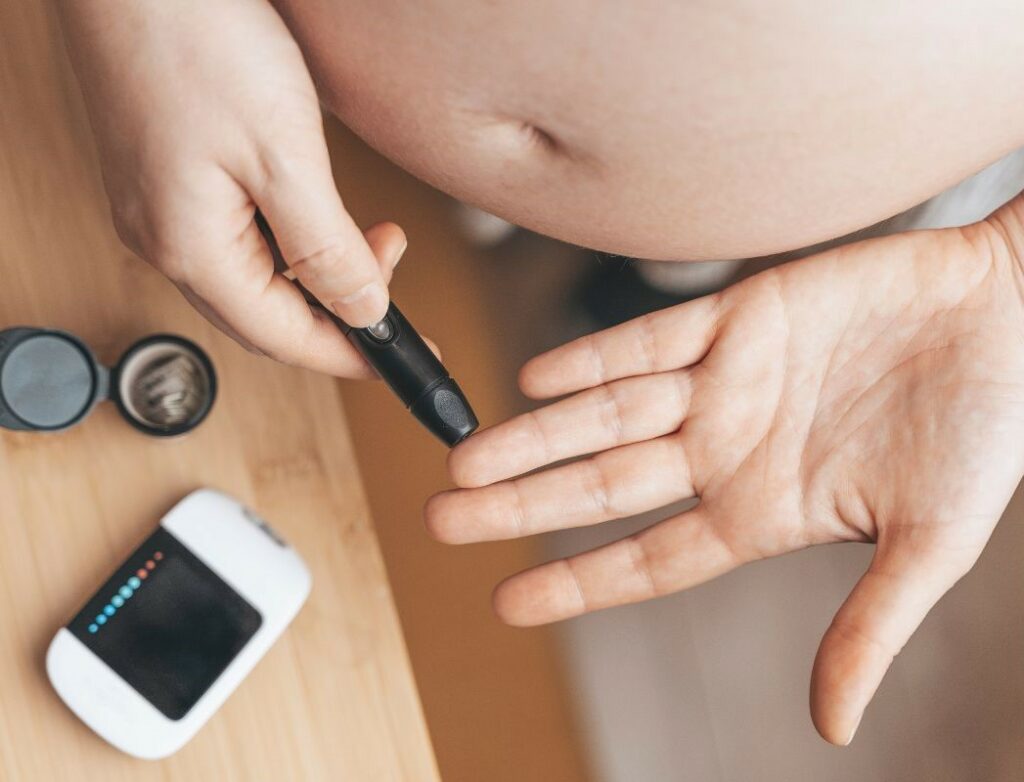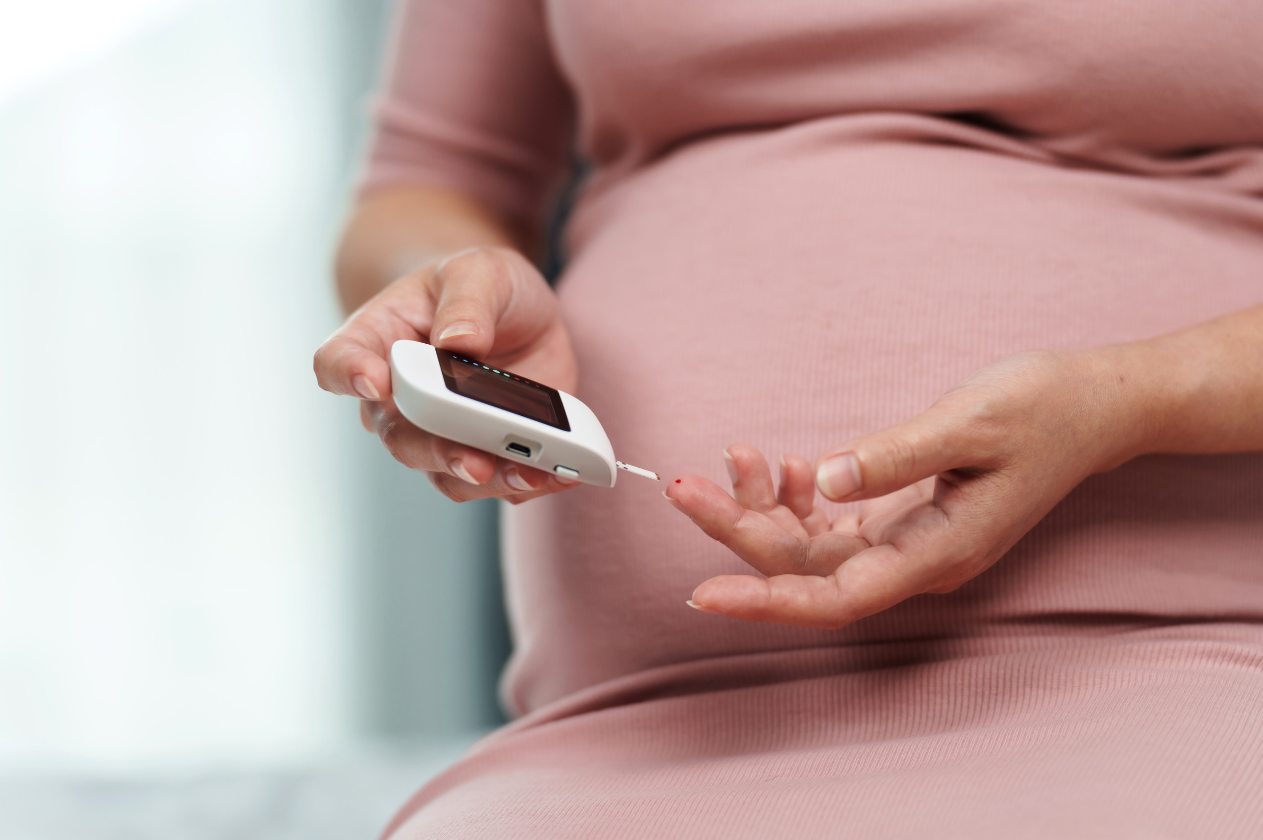Gestational diabetes mellitus (GDM) presents a unique challenge for both expectant parents and healthcare providers. It’s a condition that requires careful management, typically through nutrition and lifestyle modifications. However, a lesser-discussed aspect of this condition is its potential correlation with eating disorders, which adds layers of complexity to the management and treatment process.
In this blog post, we’ll delve into the intersection of gestational diabetes and eating disorders, exploring the research, the connection between the two, and why traditional advice might be triggering for those with a history of disordered eating.
Why Gestational Diabetes May Trigger Disordered Eating Behaviors
The strict dietary guidelines recommended for managing gestational diabetes can contribute to emotional distress and disordered eating behaviors. For some folks, the pressure to follow a rigid meal plan and restrict certain foods can evoke feelings of guilt, shame, and inadequacy. This sense of deprivation may lead to episodes of binge eating or emotional eating as a way to cope with stress and negative emotions.
Additionally, the constant focus on food and blood sugar levels may exacerbate obsessive thoughts and behaviors related to eating and body image. For individuals with a history of disordered eating, the rules and restrictions associated with managing gestational diabetes can trigger old patterns of behavior, further complicating their relationship with food and body image.
Understanding the Research
Recent studies have shed light on what we’ve known for years: there is a relationship between gestational diabetes and eating disorders. In recent studies published in the Journal of the Academy of Nutrition and Dietetics and BMC Pregnancy and Childbirth, researchers have explored the relationship between gestational diabetes and eating disorders. According to the research, folks with a history of eating disorders are at an increased risk of developing gestational diabetes during pregnancy (source).
Similarly, a study highlighted the association between binge eating disorder (BED) and gestational diabetes, suggesting that BED may be an independent risk factor for the development of gestational diabetes (source).
This doesn’t mean that if you have disordered eating you WILL get gestational diabetes, or that if you do develop gestational diabetes that you absolutely have an eating disorder or disordered eating. It just means that these are both warning signs we can look out for and are good reminders to pay a little closer attention to our bodies and what they may need.
Exploring the Connection Between Gestational Diabetes and Eating Disorders

So, why is there a connection between gestational diabetes and eating disorders? One potential explanation lies in the complex interplay of psychological, physiological, and behavioral factors. For individuals with a history of disordered eating, pregnancy can trigger anxiety and stress surrounding food and body image. The need to closely monitor blood sugar levels and adhere to a strict diet plan may exacerbate these feelings, leading to heightened anxiety and a sense of loss of control.
Moreover, traditional dietary advice for gestational diabetes, which often focuses on strict meal planning and carbohydrate restriction, can be triggering for individuals with a history of eating disorders. For someone who has struggled with disordered eating patterns in the past, rigid dietary guidelines may evoke feelings of guilt, shame, and inadequacy, ultimately worsening their relationship with food and body image.
This is why it’s crucial to evaluate your relationship with food before, during, and after pregnancy. Your disordered eating habits can have a direct result on the physical and mental health of you and your little one.
Remember, they are watching and listening to how you talk about food and your body. Don’t you want them to grow up having a better relationship with food than you did? And for those baby’s in utero, your stress can impact them too.
It can be hard to see how you relationship with food is impacting our day-to-day so take a moment today to ask yourself:
“How is my relationship with food?”
“Is there any area I could use more support?”
“How do I talk about my body?”
“Am I restricting? Bingeing? Do I feel fear around carbs or blood sugar management?”
“Could it be time to find healing with a dietitian?”
Eating Disorder or Disordered Eating?
As you read this, you may find yourself saying “there’s no way I have an eating disorder” or maybe you’ve researched the criteria and are thinking “that’s not me.” While this may be the case, it’s essential to recognize that disordered eating is still a significant concern, especially in pregnancy. Many folks will struggle with disordered eating, and for some that will eventually turn into a full-blown eating disorder.
Disordered eating refers to a range of abnormal or unhealthy eating behaviors that may not meet the criteria for a diagnosable eating disorder but still have negative effects on an individual’s physical and emotional well-being. These behaviors can include restrictive dieting, excessive calorie counting, chronic dieting, skipping meals, frequent weight fluctuations, and preoccupation with food and body image (source).
Regardless of diagnosis or no diagnosis, it’s essential to recognize that both eating disorders and disordered eating deserve compassion, understanding, and comprehensive care before, during, and after pregnancy.
Having an eating disorder or experiencing disordered eating is not your fault; it often arises from various sources and influences in your life, and may serve as a coping mechanism or way of soothing. There is no shame in having disordered eating thoughts or behaviors, and you don’t have to wait for things to get “worse” to get the care you need. You deserve support and treatment to improve your overall health and quality of life.
How Can We Move Forward? Treating Gestational Diabetes with Kindness
Addressing the intersection of gestational diabetes and eating disorders presents unique challenges for healthcare providers and individuals. While it’s crucial to manage blood sugar levels and promote a healthy pregnancy outcome, it’s equally important to approach nutrition counseling with sensitivity and awareness of the individual’s history and psychological well-being.
Instead of focusing solely on meal planning and carbohydrate counting, healthcare providers should adopt a more holistic approach that prioritizes mindful eating, intuitive eating principles, and self-compassion. Learn how to get started with this here.
Encouraging open communication and providing nonjudgmental support are also essential components of effective treatment. By creating a safe and supportive environment, healthcare providers can empower folks to make informed choices about their health while also addressing any underlying emotional and psychological concerns.
**If you don’t feel supported by your healthcare provider or they talk more about weight/calories/body size than you would like, know that you are completely valid in seeking out new care. I recommend looking for providers who advertise that they are weight-inclusive, HAES, or have experience in intuitive eating.
Conclusion
The correlation between gestational diabetes and eating disorders highlights the importance of taking a nuanced and compassionate approach to prenatal care. By recognizing the complex interplay between physical and psychological factors, healthcare providers can better support folks in managing gestational diabetes while also addressing their unique needs and concerns.
Learn more about how I (a gestational diabetes dietitian and certified intuitive counselor) can support your gestational diabetes and disordered eating recovery journey by booking a free call here.




 Hi! I’m Emily.
Hi! I’m Emily.

0 Comments